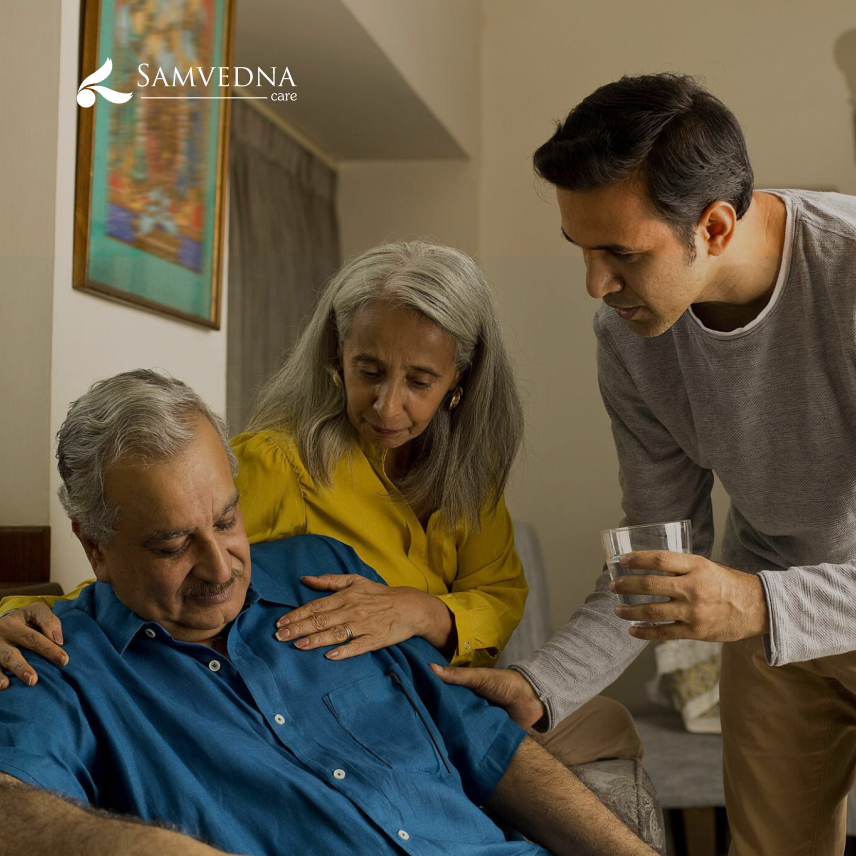Contact Us




Telling a person with dementia that someone they love has passed away can be a very emotionally draining task. Like anyone, a person with dementia may respond to bereavement in a range of ways. The person may have to be told again and again, may still be shocked, and may mourn the loss seemingly for the first time, more than once.
When someone close to a person with dementia dies, you may wonder whether to tell them and how many details to give, especially if finding out how the person died could be distressing. The approach to sharing this news requires a thoughtful and compassionate strategy. Samvedna Care, specializing in dementia care, emphasizes the importance of tailoring communication to the individual’s specific needs and circumstances.
Truth versus Lies…
If someone they love has passed away, the person with dementia diagnosis ideally deserves to know. We may tell them with the thought that they deserve to mourn the loss of their loved one. After all, the person with dementia is still the same person with feelings, emotions, and connections. Often, we go on telling the person again and again that their husband, wife, or brother has died, as we don’t want to lie to someone we love and respect.
However, for a person with dementia, sometimes it’s hard to register and remember the death. It is usually a good idea to tell them about the death initially and see how they react to the news. This will give you an idea about whether to tell them again or not. The mention of the death of their loved one seems to hit them as news every time they hear it. Telling them again and again makes them go through such a disturbing incident multiple times.
How close was this person?
Another factor that is important while making the decision is the relationship to the deceased. If the deceased is an extremely close family or friend, such as the spouse of the person with dementia, whom the person expects to see on a regular basis, it may be difficult to distract the person. Helping the person remember them, you can speak about them in past tense and sharing memories may help that person through the grieving process.
How severe is the Dementia?
When the disease has progressed too far, it becomes hard for a person with dementia to understand, remember, or process the knowledge of death. In such a situation, they may need constant reminders and may feel distressed at the knowledge every time.
They may also not process the information properly. For example, an elderly woman may feel the pain of losing a younger brother when told that her brother has passed away because she may remember her brother from a different time.
While many argue that the person with dementia still deserves to know, it may be a good idea to tell a person with such confusion only once or twice and then distract her.
Some tips for helping the elderly
The death of a loved one is difficult for anyone, but it is a special challenge when someone in the family has a dementia diagnosis. It’s hard for family members to know how and when to tell the person with dementia about the death. And what should they do when the person doesn’t remember?
Grief Process
For people without dementia, recovery from a death usually involves accepting the reality of the loss, learning to live with it, and finding a new “normal.” For most, the pain of the loss can transform into beloved memories. For someone with dementia diagnosis, this process is often impossible.
People with dementia who are grieving are often agitated and restless. They may sense that something is not right, something is missing. They may confuse one loss with another. A recent death may stimulate the memory of loss from childhood. It can be stressful for family members to decide when and how to tell them about the death of a loved one — and even how often to tell them. Repeatedly telling a person with dementia about a death can make family members’ grief more painful.
Telling About a Death
Here are some tips for telling a person with dementia about a death:
Accepting Death
Here are some ideas of ways to help the person with dementia accept the death:
If, over time, they continue to ask for the person who has died, there are some things you can do. In the beginning, gently remind them that the person has died. If reminding them becomes upsetting, you can try these ideas:
Each family has to find what works for them, and then try to be as consistent as possible. You may want to write out a simple plan for all family members and visitors to follow.
Caring for a loved one with dementia can be emotionally challenging, especially when dealing with the additional complexities of grief. Samvedna Care understands that providing care for someone with dementia can be demanding, and the emotional toll of supporting a loved one through their journey can be overwhelming. In light of this, Samvedna Care offers caregiver support and counseling services tailored to the unique needs of those caring for individuals with dementia. These services aim to provide a platform for caregivers to express their emotions, share experiences, and seek guidance on managing the various aspects of caregiving.
To assist caregivers further, Samvedna Care recommends taking caregiver burden assessments. The assessments help caregivers identify warning signs of burnout and stress, empowering them to take proactive steps to address their own needs. By recognizing and addressing caregiver burden, individuals can ensure they are better equipped to provide optimal care and support to their loved ones with dementia diagnosis. In the context of dementia diagnosis, Samvedna Care acknowledges that the caregiver’s role becomes even more crucial. They stress the significance of caregivers understanding the complexities associated with dementia and seeking professional guidance to navigate the challenges effectively.